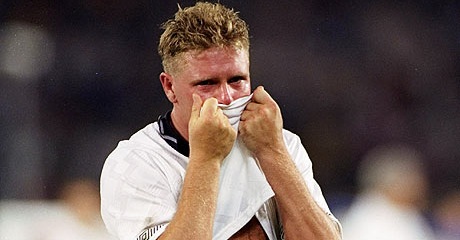
June 11, 2014, by Stephen Mumford
Football is for Losers
The day before my first birthday, England won the World Cup. England’s greatest footballing triumph passed me by. I grew up never seeing them as a World Cup team as they failed to qualify for the ’74 and ’78 finals. In 1982, I finally saw England kick their first ball in the tournament: and what a start it was, Bryan Robson scoring after 27 seconds. But that competition ended in sorrowful disappointment when Kevin Keegan missed a sitter against Spain and we were out.
It was in 1986 that the tragedy really started. England then were eliminated in no small part due to a handball goal that shouldn’t have been awarded. In 1990, we had an excellent team that made it all the way to the Semi-Finals. Then our penalty-shoot-out agony commenced as we lost to Germany: a Chris Waddle attempt blasted high over the bar. We failed to qualify in ’94 and thereafter the tragicomic defeats all seem to blur into one. There was David Beckham’s foolish sending off when he was goaded into kicking an opponent; and goalkeeper David Seaman being beat from 50 yards when he was off his line. Since ’66, the World Cup has brought England fans nothing but pain and suffering: one unjust or calamitous failure after another.
England are nothing special. 32 teams go into this year’s Finals competition. There will be only one winner. Sports films and literature often construct their narrative around victory and glory: the ultimate fulfilment to be found in success. But the most common experience of the football supporter is failure and defeat. 31 teams will exit the tournament as losers: and there were over a hundred other nations that didn’t even get this far.
Football fans should expect defeat. We have 92 teams in our domestic professional system; only one Premier League Champion. Over 600 teams enter the FA Cup each year; only one winner. Yet the game remains so popular. All these teams have fans. You can only conclude that football is for losers.
Losing is good. In the relatively harmless environment a contest like football creates, it teaches you how to cope with disappointment. Life is full of set-backs and defeats. You often won’t get that job you want, your love for another will go unrequited, or you will be publically humbled in some way. At times you might want to give up. But sport shows us that we can survive and learn from such defeats. We can come back to play again the next time. Nothing really matters in football. It is of no consequence that the ball goes into the net. But the experience of coping with hopes dashed – and recovering to face another day – provides a lesson for everyone: one invaluable when it comes to the more serious challenges of human existence.
Losing is the essence of football and life more generally. During the long period of Manchester United’s success, they had some of the most disliked fans in to the country. I’m not convinced it was all prejudice. Rather, in following a team that rarely lost, they didn’t know what football-supporting is really about. Football is for losers and that’s how it should be. Whether it’s England you support, or any of the other nations competing in Brazil this Summer, enjoy and make the most of your near-inevitable failure. Savour it, cope with it, and contemplate how much your life is thereby enhanced.
A few copies are still available of my print-on-demand book Watching Sport: Aesthetics, Ethics and Emotion (Routledge, 2011)
No comments yet, fill out a comment to be the first

Leave a Reply